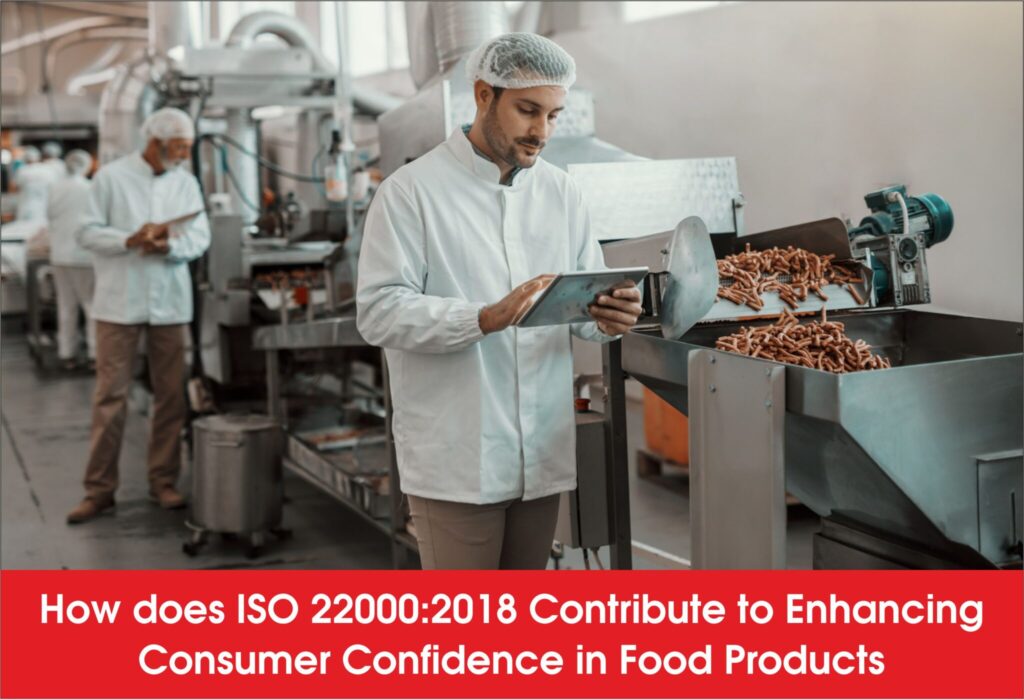How does ISO 22000:2018 Contribute to Enhancing Consumer Confidence in Food Products?

Assuring the safety and quality of food items is crucial in the fast-paced world of the food industry. Customers need food that is not only delicious but also secure for eating. Due to this demand, strict standards and norms for food safety have been developed, including ISO 22000:2018. We’ll look at how ISO 22000:2018 helps to raise consumer trust in food goods in this article. What is ISO 22000:2018 Standard? A widely accepted standard for food safety management systems is ISO 22000:2018. It offers a thorough framework for businesses participating in the food supply chain to recognise, assess, and manage food safety risks. This standard applies to suppliers, retailers, and service providers in the food business in addition to food manufacturers. The foundation is laid for an approach to maintaining food safety and preserving the quality of food from farm to fork. Ways ISO22000:2018 Contribute to Enhance Consumer Confidence in Food Products: ⮯ Building Trust through HACCP Principles – The incorporation of Hazard Analysis and Critical Control Points (HACCP) principles is one of the fundamental components of ISO 22000:2018. The HACCP systematises the process of finding, evaluating, and controlling risks to food safety. Organisations can actively control risks by putting HACCP concepts into practice, which lowers the probability of foodborne illnesses and product recalls. Comprehensive Documentation and Record-Keeping – The 2018 revision of ISO 22000 emphasises the value of record-keeping and documentation. This is essential for traceability since it allows businesses to monitor how things move through the supply chain. In the event of a safety concern, thorough records can aid in locating the issue’s origin and enable prompt corrective action. In addition to promoting regulatory compliance, this openness in record-keeping also fosters consumer confidence. Ensuring Competence through Training – The competency of the people working in the food supply chain is strongly emphasised in the ISO 22000:2018 standard. Programmes for staff members who handle food at various stages are included in this. Customers are more confident in the products when they can tell that the people handling their food are well-trained and informed about food safety. Rigorous Auditing and Certification – Organisations following ISO 22000:2018 guidelines frequently undergo demanding auditing and certification procedures. These procedures involve independent certification organisations evaluating whether an organisation complies with the standard. The fact that an organisation is ISO 22000:2018 certified gives customers further assurance that the items exceed strict safety requirements. Transparency and Consumer Communication – Increasing consumer confidence requires more than just adhering to safety requirements; it also requires openly sharing these efforts with customers. The ISO 22000:2018 accreditation is a potent marketing tool for organisations. Consumers can feel certain that a company is committed to food safety when they see labels and insignia that reflect ISO 22000:2018 compliance. Global Recognition and Consistency – The ISO 22000:2018 standard is acknowledged and regarded globally. Whether they are in Tokyo or New York, when consumers see food goods with the ISO 22000:2018 certification, they can be sure that the product has passed strict international requirements. This widespread acceptance boosts consumer trust, particularly in the case of imported goods. Conclusion ✅ Consumer confidence in food items is greatly increased by ISO 22000:2018 in a world where customers are more concerned about food safety than ever. This confidence is a result of its extensive framework, emphasis on the HACCP principles, documentation, training, and open communication. Consumer’s faith in ISO 22000:2018 certified goods is further strengthened by auditing, certification and international recognition processes. Therefore, adopting ISO 22000:2018 standards can help you achieve a competitive edge in a market where consumers value the safety and quality of the items they consume, in addition to ensuring compliance, regardless of whether you are a food manufacturer, supplier, or retailer. Enjoy Reading – What are the ISO 22000 requirements What is the role of ISO 22000:2018 Certification in ensuring the Safety of Food Products When is the right time for an organisation to go for ISO 22000:2018 Certification Guide For Food Safety Certifications
